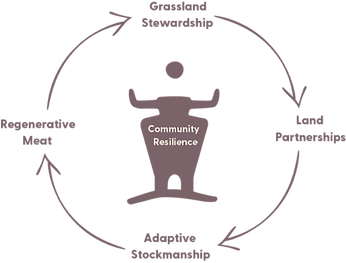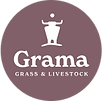
Get To Know Us:
Our Story
Who we are. Where we’ve been. Where we’re going.

The Altruistic Circle:
How Grama Grass builds community resilience
In March of 2020, after many years of careful rumination, Andy Breiter founded Grama Grass & Livestock, a regenerative meat company focused on restoring the beauty and resilience of Boulder County’s native prairie through management intensive grazing of livestock.
Using his business degree, years of experience working on ranches and farms, desire for community connection, and passion for food, Andy created a business model that forges a path to farming for first generation farmers who do not own land. Instead, Grama Grass partners with public and private landowners who financially value land regeneration.
Want to learn more about where we’ve been and where we’re going? We’re always eager to meet new members of the community. Feel free to contact us, visit our booth at the Boulder County Farmers’ Market on Saturdays, or check out our upcoming events!

Why “Grama Grass & Livestock?”
Named for Colorado’s state grass, blue grama (Bouteloua gracilis), at Grama Grass, we are, first and foremost, grass farmers. We move our herd daily and adapt our grazing plans to address each property’s needs, with the goal of nourishing our prairie ecosystem, while nourishing our community with nutrient-dense meat. Though this is more intensive than traditional cattle ranching, these practices sequester carbon, build climate resilience, and mitigate fire risk, all while beautifying the public land that people enjoy.
Our name reminds us that when we see the return of grasses and forbs native to the American West–blue grama, sideoats grama, big bluestem, and coneflowers, to name a few–it will mean that our grazing practices have successfully regenerated the prairie, providing better forage for our cattle, and more nutrient-dense meat for our community.

Grama Grass Core Values
Grassland stewardship
Prioritizing the health of Boulder County prairies through regenerative grazing methods and land monitoring
Community self-reliance
Promoting a mutually-beneficial interconnected community network that allows food producers, landowners, public entities, and local businesses to all help one another thrive
Nutrient-dense, high quality meat
Practicing techniques that ensure the highest possible quality beef, like providing constant access to fresh forage and constant tracking of herd wellness
Accessible nutrition for all
Partnering with local food pantries and organizations like Metro Caring and Emergency Family Assistance Association to bring healthy beef to nutritionally underserved communities in Boulder County
Our community vision
Meat that’s sustainable. A community that’s self-sustaining.
As we grow, we will prioritize Boulder County’s interconnected community network. Our regenerative model leans heavily on our strong ties to the local community - that’s why one of our primary goals is building and strengthening the systems that allow our community to sustain itself.
This vision is made possible by mutual trust built over years of partnership, including:
-
Land use agreements with local governments
-
Private land leases with landowners and produce farmers
-
Supplier agreements with restaurants and wholesalers
-
Ongoing relationships with local food pantries

Our Trusted Community Partners
An Inter-
Connected
Community
Network
An Interconnected Community Network: We believe we all accomplish more when we work together. Each year, we continue to grow our presence in the Boulder community, partnering with organizations for land use, wholesale, and social outreach:

Wholesale Partners
-
Pinemelon
-
CU Boulder
-
EFAA (Emergency Family Assistance Association)
-
MetroCaring
-
Longmont Food Rescue
-
Community Table Farm
-
Wild Child Farm
-
Masa Seed Foundation
-
Black Cat Farm Stand
-
Treehouse Collective
-
Growing Gardens Farm Stand
-
Nude Foods
-
Waves of Grain Co-Op
-
Boulder Wine Merchant
-
Sugar Pine Catering
-
Meadowlark Farm Dinners
-
Potager
-
Lucky Pie Pizza
-
Moxie Bread Co
-
Organic Sandwich Company
-
Boulder County Farmer's Market- Food Hub
-
Bramble & Hare
-
C-Burger
-
Corrida
-
The Academy Boulder-Communities
-
FED Foodtruck
-
Rang Tang BBQ Foodtruck
Food Pantries & Community Outreach Initiatives
-
Metro Caring & Emergency Family Assistance Association
-
In 2023, our partnership with Metro Caring helped get over 8,500 lbs. regenerative beef to nutritionally underserved communities.
That number will increase to 9,200 lbs in 2024.
-
Foodshed Partnership
-
Grama Grass leads a local group focused on building long term agricultural resilience. This group, which has been meeting for two years, features many entities throughout Boulder County.
NGOs, Public Entities, & Private Landowners
-
Colorado Ag Water Alliance: Drought Resiliency Bale Grazing Project
-
Boulder County: Office of Sustainability Climate Action and Resilience
-
aCity of Boulder’s Open Space & Mountain Parks Division
-
Kilt Farm
-
Red Wagon Farm
-
Esoterra Culinary Garden
-
Louisville Parks, Recreation & Open Space Department
-
A private landowner in Longmont, as part of an initiative to to regenerate a 160 acre parcel of land with Rangeland Living Laboratory, a non-profit organization that supports and monitors the health of rangelands
-
Shared Learning Collaborative: A group of citizens working to find the radical center between prairie dogs and agriculture
Community health of the local landscape
Working together for healthier land
Our partnerships in the community are a crucial piece of our regenerative methods. Our rotational grazing process involves allowing our herd to impact and fertilize the soil, followed by periods of intermittent rest, effectively emulating the regenerative benefits of the native bison migration that kept our prairies healthy for milennia. By working with local land owners and public entities in the community, we’re able to move our herd frequently: at least once per day within a property, and around once per month among properties.
This crucial movement of the herd provides numerous benefits, including:
-
Soil health for improved agricultural farming and more nutritive crop yield
-
Restoration of native species and biodiversity
-
Carbon sequestration
-
Weed and invasive species management
-
Wildfire mitigation
The result? Revitalized farmland to improve the local produce we consume regularly, more vibrant public recreational land spaces, and healthier surroundings for all.

“Meat” the herd
Our meat is different because our herd is different. Our regenerative grazing process relies on frequently rotating our herd’s location, allowing them to graze on fresh forage at all times, while simultaneously regenerating the land.
We currently care for around 90 cows, moving them at least once per day.
What’s on their menu?
Corn, grain? Our herd’s never heard of it. A variety of grass species is one of the key factors that gives our beef its nutrient-density and complex flavor profile.
Boulder-native grass species we promote the growth of:
-
Switchgrass
-
Big Bluestem
-
Prairie Cone Flower
-
Blue Grama Grass
-
Sideoats Grama Grass
-
Buffalo Grass
-
Western Wheat Grass
-
Green Needle Grass
-
Little Bluestem
Invasive species our grazing reduces:
-
Canada Thistle
-
Common Teasel
-
Bindweed
-
Pepperweed
-
Cattail, Reed
-
Canary Grass
-
Cheat grass
...and more!

Can you spot us?
Our herd’s always on the go. Try to keep up!
Track our herd below and follow us as we migrate all across Boulder County.
Where to next?
Some other places our herd can be found grazing include:
City of Boulder OSMP Properties: Andrus North, Andrus South, Minnetrista II, Canino, Aweida, Williamson, Hartnagel, Warner
City of Louisville Properties: Davidson Mesa, North
Boulder County Properties: Chandler Open Space, James Construction
Privately Owned Properties: Bohn Lake, Left Hand Valley
Vegetable Farm Partners: Red Wagon Farm, Kilt Farm, Esoterra Culinary Garden, Off Beet Farm

Grama Grass is growing
In Grama Grass’ first season, Andy worked alone, custom grazing 25 cattle on one property and impacting 70 acres. Now in our fifth year of operation, our numbers have grown many times over.
We now have five employees and annually oversee 200+ cattle, impact nearly 500 acres, and produce approximately 85,000 pounds of meat.
.png)
Interested in working with us as we continue to grow and expand? Visit our careers page!
.png)